大工10秋《大学英语1(开放英语1)》辅导资料八
《大学英语(一)》开篇导学资料
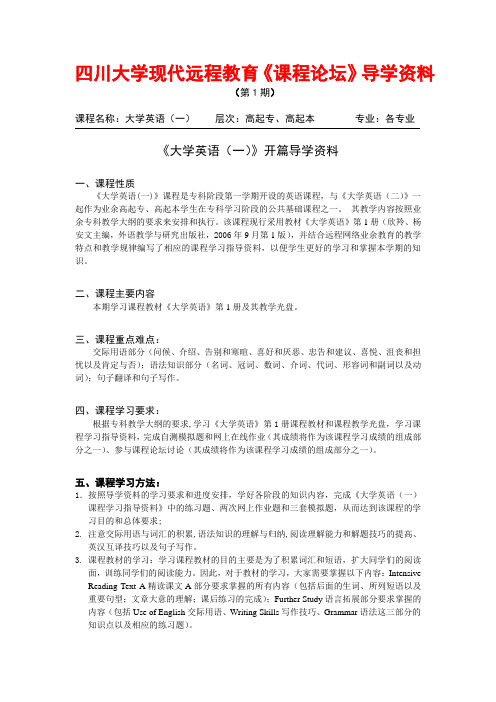
四川大学现代远程教育《课程论坛》导学资料(第1期)课程名称:大学英语(一)层次:高起专、高起本专业:各专业《大学英语(一)》开篇导学资料一、课程性质《大学英语(一)》课程是专科阶段第一学期开设的英语课程,与《大学英语(二)》一起作为业余高起专、高起本学生在专科学习阶段的公共基础课程之一。
其教学内容按照业余专科教学大纲的要求来安排和执行。
该课程现行采用教材《大学英语》第1册(欣羚、杨安文主编,外语教学与研究出版社,2006年9月第1版),并结合远程网络业余教育的教学特点和教学规律编写了相应的课程学习指导资料,以便学生更好的学习和掌握本学期的知识。
二、课程主要内容本期学习课程教材《大学英语》第1册及其教学光盘。
三、课程重点难点:交际用语部分(问候、介绍、告别和寒暄、喜好和厌恶、忠告和建议、喜悦、沮丧和担忧以及肯定与否);语法知识部分(名词、冠词、数词、介词、代词、形容词和副词以及动词);句子翻译和句子写作。
四、课程学习要求:根据专科教学大纲的要求,学习《大学英语》第1册课程教材和课程教学光盘,学习课程学习指导资料,完成自测模拟题和网上在线作业(其成绩将作为该课程学习成绩的组成部分之一)、参与课程论坛讨论(其成绩将作为该课程学习成绩的组成部分之一)。
五、课程学习方法:1.按照导学资料的学习要求和进度安排,学好各阶段的知识内容,完成《大学英语(一)课程学习指导资料》中的练习题、两次网上作业题和三套模拟题,从而达到该课程的学习目的和总体要求;2. 注意交际用语与词汇的积累,语法知识的理解与归纳,阅读理解能力和解题技巧的提高、英汉互译技巧以及句子写作。
3. 课程教材的学习:学习课程教材的目的主要是为了积累词汇和短语,扩大同学们的阅读面,训练同学们的阅读能力。
因此,对于教材的学习,大家需要掌握以下内容:Intensive Reading Text A精读课文A部分要求掌握的所有内容(包括后面的生词、所列短语以及重要句型;文章大意的理解;课后练习的完成);Further Study语言拓展部分要求掌握的内容(包括Use of English交际用语、Writing Skills写作技巧、Grammar语法这三部分的知识点以及相应的练习题)。
大工11秋《大学英语1(远程英语1)》在线测试2

正确答案:C
2. Don't make the young child _____ a lot of homework.
A. doing
B. did
C. to do
D. do
正确答案:D
3. The Chang Jiang River is _____ river in the world.
A. to meet
B. meeting
C. having meet
D. have met
正确答案:B
5. Don't forget ____ the door when you leave.
A. to lock
B. lock
C. locking
D. locked
正确答案:A
8. Judged by ordinary standards, he was reliable.
A. 错误
B. 正确
正确答案:B
9. In the house, we found lots of food leaving by the host.
A. 错误
B. 正确
正确答案:A
A. swim
B. swimming
C. to swim
D. swam
正确答案:B
8. I am sorry ____ you so much trouble.
A. to give
B. to have given
C. to giving
D. to have giving
正确答案:B
大工11春《大学英语1(远程英语1)》在线作业及答案
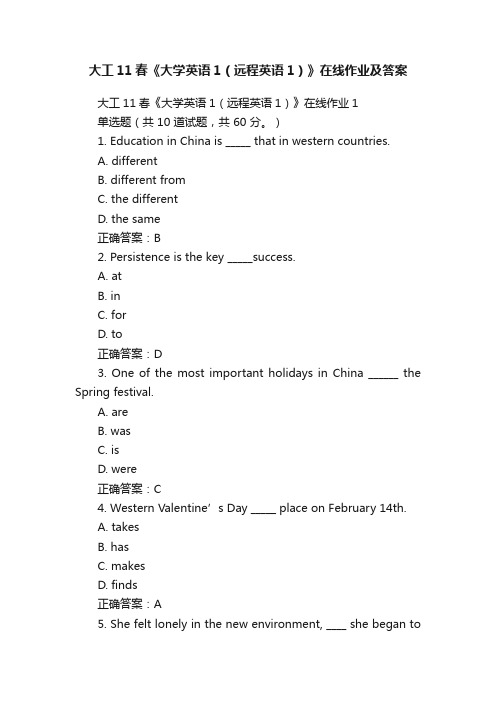
大工11春《大学英语1(远程英语1)》在线作业及答案大工11春《大学英语1(远程英语1)》在线作业1单选题(共 10 道试题,共 60 分。
)1. Education in China is _____ that in western countries.A. differentB. different fromC. the differentD. the same正确答案:B2. Persistence is the key _____success.A. atB. inC. forD. to正确答案:D3. One of the most important holidays in China ______ the Spring festival.A. areB. wasC. isD. were正确答案:C4. Western Valentine’s Day _____ place on February 14th.A. takesB. hasC. makesD. finds正确答案:A5. She felt lonely in the new environment, ____ she began tomiss her family.A. butB. yetC. soD. although正确答案:C6. Would you like to _____?A. take bathB. take a bathC. make batheD. make a bathe正确答案:B7. The soldiers were _____ to shoot the enemies.A. orderB. orderedC. ordersD. ordering8. She usually ______ newspaper in the morning.A. readB. readsC. is readD. are read正确答案:B9. Kids are told not to play _____ fire.A. inB. atC. toD. with正确答案:D10. She gradually became ______ in foreign languages.A. interestB. interestingC. interestedD. interests正确答案:C判断题(共 10 道试题,共 40 分。
2010 开放英语I(1)复习要点
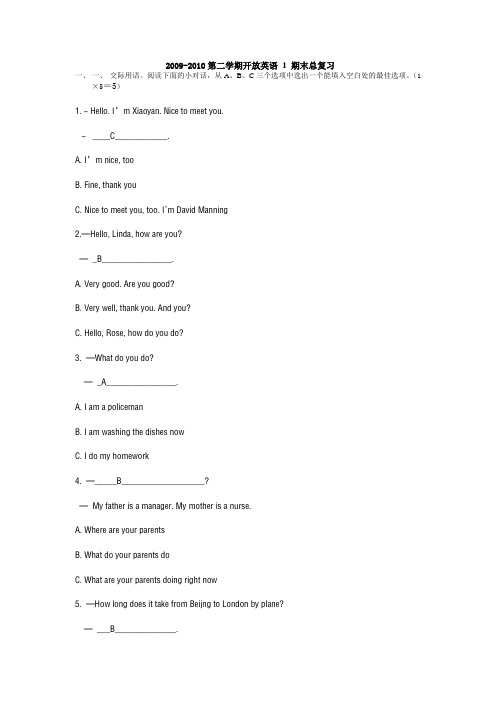
2009-2010第二学期开放英语 1 期末总复习一、一、交际用语。
阅读下面的小对话,从A、B、C三个选项中选出一个能填入空白处的最佳选项。
(1×5=5)1.-Hello. I’m Xiaoyan. Nice to meet you.-____C____________.A. I’m nice, tooB. Fine, thank youC. Nice to meet you, too. I’m David Manning2.—Hello, Linda, how are you?—_B________________.A. Very good. Are you good?B. Very well, thank you. And you?C. Hello, Rose, how do you do?3. —What do you do?—_A________________.A. I am a policemanB. I am washing the dishes nowC. I do my homework4. —_____B___________________?—My father is a manager. My mother is a nurse.A. Where are your parentsB. What do your parents doC. What are your parents doing right now5. —How long does it take from Beijng to London by plane?—___B______________.A. It costs 1,200 dollarsB. It takes about 7 hoursC. It’s not near enough6. —How long does it take to go there by train? —________B_________.A. It is 20 poundsB. It takes 20 hoursC. The training is very fast7. —What time does the train leave?—__________C_______.A. On TuesdayB. In the morningC. At half past five8. —The shower isn’t working.—__B_______________.A. I come to call the plumberB. I’ll call the plumberC. I like calling the plumber9.—Would you like to go with us?—_C________________.A. Ok, I’d loveB. I would likeC. I’d love to10. —____B_____________?—An orange juice, please.A. What do you likeB. What would you likeC. Would you like an orange juice11.—_C________________.—That’s a good idea.A. When can you write the invitationsB. What do you think of the invitationsC. Why don’t we write the invitations now12. —Could you ring them up please? I’m sometimes quite nervous on the phone.—____C________________A. Are you? I am fine.B. Yes, why don’t you call them?C. Yes, of course. I will phone them for you.13. —How about seeing a film this evening?—Yes, ____A_________.A. that’s a good ideaB. pleaseC. that’s right14. —Excuse me, where is the nearest bank, please?—____C_____________.A. It’s not sureB. That’s all rightC. It’s next to the newsagent15. —Excuse me, how do I get to the gym, please?—___A______________.A. You take the number 866 bus from the supermarketB. It takes about an hour to get thereC. I’d like to see them16. —What does your English teacher look like?—__B_______________.A. She likes singingB. She’s tall and has long, wavy hairC. She looks sad17. —What does her boyfriend look like?—____C_____________.A. He is intelligent and confidentB. He likes playing footballC. He is quite tall with fair curly hair18. —What’s the weather like in this area?—_____B____________.A. That’s all rightB. It’s rainyC. Yes, it’s fine19.—How much is the rent of the flat?—_____B____________.A. The hotel room is expensiveB. It is 450 pounds a monthC. It is near the center of the city20. —____A_____________?—I’ve got a bad cough.A. What’s the matter with youB. What is it likeC. How was your day yesterday二、选择填空。
3---《大学英语1(开放英语1)》学习方案

Unit13
1.学习时间表达法;学习与体育有关的词汇
2.学习提出请求;练习wh-问句;学习时间表达法;一般现在时表示将来的用法
3.动词to be的过去时;描述情感和过去的经历;
13
Unit14
1.描述人的特点和能力;学习与信息通信技术和招聘相关的词汇
2.形容词的比较级;描述技能和兴趣;
3.谈论未来安排;
4.一般现在时;正在进行时;方位介词的用法;
8
Unit8
1.谈论日常活动;表示允许;
2.谈论正在发生的事;描述天气和城镇状况;
3.学习表达方位的介词;表达指令;
4.一般现在时;正在进行时;方位介词的用法;
9
Unit9
1.学习表示方位的介词;店铺名称;定冠词和不定冠词
2.问路;学习短语动词;
3.谈论人的外貌和性格特征;
5
Unit5
1.澄清意思;描述公寓;提出提议;
2.描述公寓的用语;如何谈论价格;
3.学习描述住所,及有关家具的词汇;
6
Unit7
1.问路;表达提议、提供建议;
2.描述住房条件;表达批评;
3.打电话;预约时间;
7
Unit8
1.谈论日常活动;表示允许;
2.谈论正在发生的事;描述天气和城镇状况;
3.学习表达方位的介词;表达指令;
10
Unit10
1.学习食物词汇;练习表达提议;学习可数名词和不可数名词;
2.学习使用How much…和How many…句型;学习some和any;学习动词need;
11
Unit11
1.学习如何表达意见;如何对他人的意见做出反应;borrow和lend用法
2.表达喜好及表示同意;
福师10秋学期《大学英语(1)》在线作业一
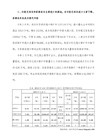
D. to have heard
14. David ____________himself while he ____________the machine.
A. was played
49. We can go when the ground____________.
B. has dried
50. A number of paintings in the castle are believed____________in a fire.
A. be finished
45. It ____________ whether he will go on with his study at the university.
A. hasn't been decided
46. This company was the first____________portable radios as well as cassette tape recorders in the world.
C. hearing ... say ... repairing
17. He ____________the Communist Party____________2002.
D. joined, in
18. The purpose of new technology is to make life easier,____________it more difficult.
大工10秋《大学英语1(开放英语1)》辅导资料七
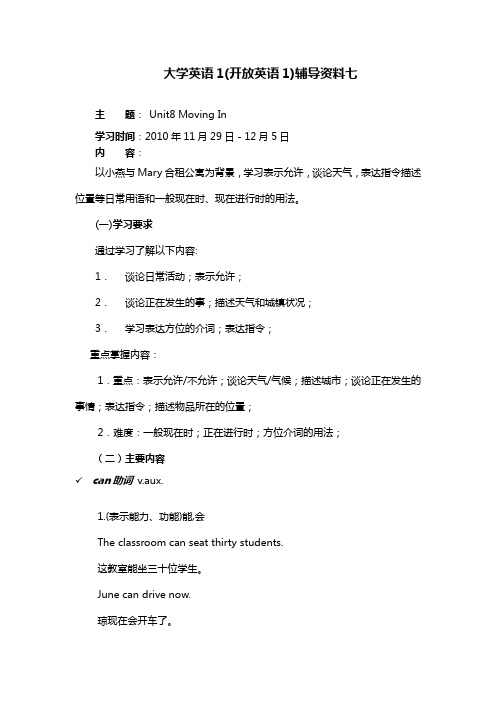
大学英语1(开放英语1)辅导资料七主题:Unit8 Moving In学习时间:2010年11月29日-12月5日内容:以小燕与Mary合租公寓为背景,学习表示允许,谈论天气,表达指令描述位置等日常用语和一般现在时、现在进行时的用法。
(一)学习要求通过学习了解以下内容:1.谈论日常活动;表示允许;2.谈论正在发生的事;描述天气和城镇状况;3.学习表达方位的介词;表达指令;重点掌握内容:1.重点:表示允许/不允许;谈论天气/气候;描述城市;谈论正在发生的事情;表达指令;描述物品所在的位置;2.难度:一般现在时;正在进行时;方位介词的用法;(二)主要内容✓can助词v.aux.1.(表示能力、功能)能,会The classroom can seat thirty students.这教室能坐三十位学生。
June can drive now.琼现在会开车了。
2.(表示可能性)可能,可能会I think the work can be completed ahead of time. 我认为这项工作能提前完成。
3.(表示允许、请求)可以You can't take the book out of the room.你不可以将这本书拿出室外。
Can I use your pen?我可以用一下你的笔吗?4.(表示命令)必须If you won't keep quiet you can get out.你如不保持安静,就请你走。
5.(表示偶然发生的可能性)有时会It can be quite windy there, especially in spring. 那里有时容易刮风,特别在春季。
6.(表示惊讶)究竟;竟至于What can it possibly be?到底那是怎么一回事?✓一般现在时它表示:1)经常性、习惯性的动作或存在的状态。
e.g. I go to school on foot.He is very busy now.2)表示主语的特征、性格、能力、爱好等。
大连理工大学大工21秋《大学英语1(远程英语1)》在线测试1-00001

大连理工大学大工21秋《大学英语1(远程英语1)》在线测试1-000011.Paper cuts of animals have been found in tombs which date back ()the time ofthe Northern and Southern Dynasty!A.aboutB.ofC.toD.with第1题正确答案:Cmit to()yourself first .A.payB.paidC.to payD.paying第2题正确答案:D3.I began to suspect they were trying to get ()of me.A.upB.riddingC.riddedD.rid4.I have a hard time ()apart the twins.A.gotB.gettingC.toldD.telling第4题正确答案:D5.Did you pick () my suit from the cleaners?A.downB.inC.upD.around第5题正确答案:C6.I didnt pay attention to () Lisa was saying.A.thatB.whichC.whereD.what第6题正确答案:D7.It was a great vacation except () one problem.A.ofB.inC.toD.for8.How about () basketball this afternoon?A.playingB.to goC.playD.get第8题正确答案:A9.What is really important is how we () use of ouradvantages.A.madeB.makeC.takeD.took第9题正确答案:B10.You can use milk instead () cream in this recipe.A.onB.upC.ofD.off第10题正确答案:C11.You can watch your () movies.A.like mostB.likingC.loveD.favourite第11题正确答案:D12.Is your mother a doctor () a teacher?A.butB.andC.soD.or第12题正确答案:D13.Lisa, hold () my hand while we cross the street.A.ofB.ontoC.inD.to第13题正确答案:D14.Are you going to () the first orientation party?A.part inB.take part inC.takes part inD.took part in第14题正确答案:B15.Ill have tea instead () apple juice, please.A.withB.ofC.inD.about第15题正确答案:B16.How about () this sofa?A.buyB.to buyC.buyingD.bought第16题正确答案:C17.He is famous () his fine acting.A.forB.toC.as#about第17题正确答案:A18.Tom Hanks is () as a famous actor.A.knowB.knewC.knownD.knows第18题正确答案:C19.He plays pop music, as () as classic and jazz.A.isB.willC.as well asD.well20.Quite a few employees have a () attitude to thelow salary.A.mentalB.vitalC.negativeD.positive第20题正确答案:C21.Her illness is due to bad food.T.对F.错第21题正确答案:T22.Old people have lots of priorities.T.对F.错第22题正确答案:T23.My parents is proud of me.T.对F.错第23题正确答案:F24.Linda had a difficult time tolerate the pain.T.对F.错25.Luke surprising me that he could be so charming.T.对F.错第25题正确答案:F26.As a result, I miss out the performance so I felta little bit unhappy.T.对F.错第26题正确答案:F27.Let us join hands and advance together.T.对F.错第27题正确答案:T28.Our coach always said that unity is the key towinning the match.T.对F.错第28题正确答案:T29.Lynns dressing style is different to yours.T.对F.错30.The beef will be freeze when in the fridge.T.对F.错第30题正确答案:F。
- 1、下载文档前请自行甄别文档内容的完整性,平台不提供额外的编辑、内容补充、找答案等附加服务。
- 2、"仅部分预览"的文档,不可在线预览部分如存在完整性等问题,可反馈申请退款(可完整预览的文档不适用该条件!)。
- 3、如文档侵犯您的权益,请联系客服反馈,我们会尽快为您处理(人工客服工作时间:9:00-18:30)。
大学英语1(开放英语1)辅导资料八主题: Unit9 Things and People学习时间:2010年12月6日-12月12日内容:本单元以Mary向小燕介绍住地情况为背景,主要学习问路/指路;描述外貌/性格等日常用语以及一些动词短语。
(一)学习要求通过学习了解以下内容:1.学习表示方位的介词;店铺名称;定冠词和不定冠词2.问路;学习短语动词;3.谈论人的外貌和性格特征;重点掌握内容:1.重点:描述住地设施的方位;问路/指路;谈论人的外貌和性格特征;2.难点:方位的介词的用法;定冠词和不定冠词;相关短语动词的用法;(二)主要内容店铺名称英语中有些店铺的名称有经营商加‘s构成。
’s相当于‘s shop,表示经营者的处所。
这类店铺名称还可以直接写经营商的职业。
,例如the butcher(肉商/肉店),the butcher’s(肉店),the chemist(药剂师/药店),the chemist’s(药店),这两种书写形式可以互换。
问路与指路1.问路常用句式为:a、Where is+场所?b、Where is the nearest +场所?c、Is there +a/an+场所?Is there a bank near here?Yes, the bank is on the corner, near the station.Yes, there is. There is a bank on the corner, near the station.I’m sorry, I don’t know.Where is the nearest supermarket, please?The supermarket is over there opposite the café.Where is the bus shop?The bus shop is outside the greengrocer’s.2.就乘车问路和指路,常用get一词How do I get there?You take the number 38 bus.How do I get to the bus station?Where do I get on?You get on the greengrocer’s.Where do I get off?You get off at the bus station.get的短语1、get about [around](1) (能)到处走动,旅行。
如:He didn’t get about much after the operation. 手术后他不常外出去动。
It’s easy in this city to get about by bus. 在本市乘公共汽车去各处都很方便。
(2) (消息、谣言等)传播,流传。
如:I don’t mind you knowing, but I don’t really want it to get about. 我不是不让你知道,但我实在不想让它传出去。
2. get along(1) 离开(某地)。
如:It’s time we were getting along. 我们该走了。
(2) 相处,过日子,合得来。
如:How are you getting along (with her)? 你(宋体>与她)过得怎样?(3) 进展。
如:How are you getting along with your work? ">?3. get away(1) 离开,逃离,逃走。
如:I won’t be able to get away (from the office) before 7. 我七点以前离不开(我七点以前ce=宋体>办公室)。
(2) 逃避责罚,免受处罚,受较轻处罚。
如:If you cheat in the exam, you’ll never get away with it. 考试作弊必予追究。
4. get back(1) 返回,回家。
如:When did you get back from Paris? 你是什么时候从巴黎回来的?(2) 取回,拿回,失而复得。
如:He got back the watch he lost. 他丢的表找回来了。
5. get down 下来,取下,放下,弄下,写下,打下,吞下。
如:The boy climbed up the tree and couldn’t get down. 小男孩爬上树,却下不来了。
We managed to get down enemy planes. 我们设法打下了两架敌机。
6. get down to (6doing) sth 开始做某事,认真处理某事。
如:It’s time we got down to some serious work. 我们该认真干点正事了。
7. get in(1) 进站,到达,回来。
如:(1)'Times New Roman'">The train (plane) got in late. 火车(飞机)晚点了。
I’ll phone him as soon as I get in. 我一到家就给他打电话。
(2) 请来。
如:They have got the doctor in to look at the child. 他们已请来大夫给孩子看病。
(3) 插话。
如:He talks so much that it’s impossible to get a word in. 他说个不停,别人休想插话。
(4) 收获,收割。
如:The villagers were busy getting the harvest in. 村民们在忙于收获庄稼。
8. get off(1) 起飞,动身,出发。
如:The plane got off on time. 飞机准时起飞。
We got off immediately after breakfast. 我们吃完早餐就动身了。
(2) 下班,下车。
如:下班,下车。
如:mso-char-indent-count: 2.0; mso-char-indent-size: 10.5pt; mso-line-height-rule: exactly">We get off at five. 我们五点下班。
I’ll get off at the next stop. 我在下一站下车。
(3) 从轻处罚,被放过。
如:He got off with a small fine. 他交了一小笔罚款了事。
9. get on(1) 上车。
如:The bus came and we got on. 公共汽车来了,我们就上了车。
(2) 相处。
如:He is not an easy man to get on with. 他不好相处。
(from )10. get out(1) 出来,出去,离开。
如:The door was locked and we couldn’t get out. 门被锁上了,我们无法出去。
D(21)(2) 拿出,取出。
如:He got out a dictionary and looked up the word in it. 他拿出一本词典来查这个词。
(3) 出版,发表。
如:We hope to get the report out before the end of the month. 我们希望在这个月底发表这个报告。
(4) 泄漏,传出。
如:If the secret gets out, there will be trouble. 如果秘密泄漏出去,那就麻烦了。
11. get out of(1) 逃避,躲掉。
如:He tried to get out of helping me. 他企图逃避给我帮助。
(2) 放弃,戒除,停止。
如:You must get out of that bad habit. 你必须戒除那个坏习惯。
He told me to get out of smoking. 他叫我戒烟。
12. get over(1) 走过,越过,渡过。
如:How can we get over the river? 我们怎样过河?(2) 克服,战胜。
如:She can’t get over her shyness. 她克服不了羞怯感。
(3) 恢复,痊愈。
如:Have you got over your cold yet? 你的感冒好了没有?13. get through(1) 做完,用完,吃完,看完。
如:There’s a lot of work to get through. 有很多工作要做。
(2) 通过(考试),接通(电话),度过(时间)。
如:Did you get through your driving test? 你的驾驶测验通过了吗?14. get together 聚会,联欢。
如:When can we get together? 我们什么时候可以聚一聚?15. get up(1) 起床,起身。
如:I get up at six every morning. 我每天早上六点钟起床。
The class got up when the teacher came in. 老师进来时,全班学生都站起来。
(2) 举办。
如:We are getting up a party for he; MARGIN-BOTTOM: 0pt; TEXr birthday. 我们要给她开个生日庆祝会。
(from )16. get doing(1) 继续做某事。
如:Get moving, please. (不要停下)请往前走。
(2) 开始做起某事来。
如:Soon I got talking to her. 很快我就同她谈起话来了。
17. get done(1) 被……。
如:He got caught for speeding. 他因超速而被抓住。
Some glasses got broken when we were moving. 我们在搬家时有些玻璃杯被打破了。
(2) 处于某种状态eight: normal">Soon he got dressed and went out. 他很快穿好衣服出去了。
Don’t get excited about it. 不要为此事激动。
18. get sb sth / get sth for sb sth / 为某人弄到某物。
如:Let’s get them something to eat. 咱们先给他们弄点东西吃。
